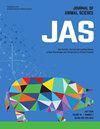303奖励演讲:添加l -谷氨酸和l -天冬氨酸对产肠毒素大肠杆菌F18攻毒断奶仔猪生长性能、腹泻严重程度、免疫反应和肠道屏障完整性的影响
IF 2.7
2区 农林科学
Q1 AGRICULTURE, DAIRY & ANIMAL SCIENCE
引用次数: 0
摘要
l -谷氨酸(Glu)和l -天冬氨酸(Asp)在猪的细胞代谢和免疫调节中起重要作用。本试验研究了添加谷氨酸和Asp对产肠毒素大肠杆菌(ETEC) F18致毒断奶仔猪生长性能、免疫反应和肠道完整性的影响。选取49头体重(8.18±1.54 kg BW)的断奶仔猪,随机分为7组(n = 7):阴性对照组(NC)和阳性对照组(PC)饲喂对照饲粮,5组分别添加1%或2%谷氨酸、1%或2% Asp和50 mg/kg卡巴多斯。除NC外,所有猪在适应7天后连续3天口服F18 ETEC (1010 CFU/剂量/天)。接种后延长14 d。在整个研究过程中记录体重、饲料消耗和粪便评分。在特定时间点采集粪便和血液样本,分别通过细菌培养和全血细胞计数进行细菌脱落分析和血液谱分析。于第14天采集空肠和回肠肠黏膜,通过定量逆转录聚合酶链反应分析细胞因子和紧密连接蛋白的表达。数据采用SAS的PROC MIXED方差分析。腹泻频次采用卡方分析。与PC相比,饲喂1%谷氨酸或2% Asp的猪(P <;0.05),断奶后前2周平均日增重和料重比。此外,添加1%或2%的Asp可降低(P <;0.05)腹泻严重程度与PC比较。添加1%的Asp也增加了(P <;(0.05)十二指肠绒毛高度和回肠绒毛宽度显著高于卡巴多克斯。此外,1% Glu降低(P <;β-溶血性细菌粪便排出量在第14天与PC相比降低(P < P < 0.05);(0.05)中性粒细胞与淋巴细胞的比例在第2天和第5天的PI,显示出与卡多克斯相当的效果。此外,1% Glu或2% Asp上调(P <;0.05), IFN-γ的表达趋势与卡巴多相似。补充1%谷氨酸上调(P <;0.05)空肠IL-17A和IL-22的表达。此外,2% Asp猪的P &;lt;0.05)空肠IL-6高于PC。有趣的是,补充2%的Asp降低了(P <;0.05),空肠CLDN-1升高(P <;0.05)回肠CLDN-1。与PC相比,1% Asp上调(P <;0.05)回肠OCDN和ZO-1。综上所述,添加谷氨酸或Asp可提高ETEC攻毒仔猪的生长性能和抗病能力。本文章由计算机程序翻译,如有差异,请以英文原文为准。
303 Award Talk: Effects of L-glutamate and L-aspartate supplementation on growth performance, diarrhea severity, immune responses, intestinal barrier integrity of weaned piglets challenged with enterotoxigenic Escherichia coli F18
L-glutamate (Glu) and L-aspartate (Asp) play critical roles in cellular metabolism and immune regulation in pigs. This study investigated the effects of Glu and Asp supplementation on growth performance, immune responses, and intestinal integrity in weaned piglets challenged with enterotoxigenic Escherichia coli (ETEC) F18. Forty-nine weaned pigs (8.18 ± 1.54 kg BW) were randomly assigned to one of seven treatments (n = 7): a negative control (NC) and a positive control (PC) fed a control diet, and five groups supplemented with 1% or 2% Glu, 1% or 2% Asp, or 50 mg/kg Carbadox. All pigs, except NC, were orally challenged with F18 ETEC (1010 CFU/dose/day) for three consecutive days after 7 days adaptation. The study lasted 14 additional days post-inoculation (PI). Body weights, feed consumption, and fecal scores were recorded throughout the study. Fecal and blood samples were collected at specific time points for bacterial shedding analysis through bacterial culture and blood profile analysis via complete blood cell count, respectively. Intestinal mucosa from the jejunum and ileum was collected on d 14 PI for cytokine and tight junction protein expression analysis via quantitative reverse transcription polymerase chain reaction. Data were analyzed using ANOVA in PROC MIXED of SAS. Frequency of diarrhea was analyzed by Chi-square. Compared with PC, pigs fed 1% Glu or 2% Asp had improved (P < 0.05) average daily gain and gain-to-feed ratio during the first two weeks post-weaning. Additionally, 1% or 2% Asp supplementation reduced (P < 0.05) diarrhea severity compared with PC. 1% Asp supplementation also increased (P < 0.05) duodenal villi height and ileal villi width in pigs than Carbadox. Moreover, 1% Glu reduced (P < 0.05) fecal shedding of β- hemolytic bacteria compared with PC on d 14 PI and decreased (P < 0.05) neutrophil-to- lymphocyte ratio on d 2 and d 5 PI, showing effects comparable to Carbadox. Furthermore, 1% Glu or 2% Asp upregulated (P < 0.05) ileal IL-12 compared with PC and Carbadox, while exhibited trends in IFN-γ expression similar to Carbadox. Supplementing 1% Glu upregulated (P < 0.05) jejunal IL-17A and IL-22 expression compared with NC and Carbadox. Furthermore, 2% Asp pigs had lower (P < 0.05) jejunal IL-6 than PC. Interestingly, 2% Asp supplementation decreased (P < 0.05) jejunal CLDN-1, while increased (P < 0.05) ileal CLDN-1 compared with NC. Compared with PC, 1% Asp upregulated (P < 0.05) ileal OCDN and ZO-1. In conclusion, Glu or Asp supplementation enhanced growth performance and disease resistance in weaned pigs challenged with ETEC.
求助全文
通过发布文献求助,成功后即可免费获取论文全文。
去求助
来源期刊

Journal of animal science
农林科学-奶制品与动物科学
CiteScore
4.80
自引率
12.10%
发文量
1589
审稿时长
3 months
期刊介绍:
The Journal of Animal Science (JAS) is the premier journal for animal science and serves as the leading source of new knowledge and perspective in this area. JAS publishes more than 500 fully reviewed research articles, invited reviews, technical notes, and letters to the editor each year.
Articles published in JAS encompass a broad range of research topics in animal production and fundamental aspects of genetics, nutrition, physiology, and preparation and utilization of animal products. Articles typically report research with beef cattle, companion animals, goats, horses, pigs, and sheep; however, studies involving other farm animals, aquatic and wildlife species, and laboratory animal species that address fundamental questions related to livestock and companion animal biology will be considered for publication.
 求助内容:
求助内容: 应助结果提醒方式:
应助结果提醒方式:


